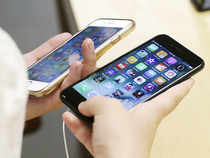Artificial light emitted from digital devices such
smartphones and tablets could reduce the quality of your sleep, a study has
warned.
The largest source of blue light is sunlight, but it is also found in most LED-based devices. Blue light boosts alertness and regulates our internal body clock, or circadian rhythm, that tells our bodies when to sleep.
The largest source of blue light is sunlight, but it is also found in most LED-based devices. Blue light boosts alertness and regulates our internal body clock, or circadian rhythm, that tells our bodies when to sleep.
This artificial light activates photoreceptors called
intrinsically photosensitive retinal ganglion cells (ipRGCs), which suppresses
melatonin, the hormone that signals your body that it is time to sleep.
"The most important takeaway is that blue light at night time really does decrease sleep quality. Sleep is very important for the regeneration of many functions in our body," said Lisa Ostrin, assistant professor at University of Houston in the US.
"The most important takeaway is that blue light at night time really does decrease sleep quality. Sleep is very important for the regeneration of many functions in our body," said Lisa Ostrin, assistant professor at University of Houston in the US.
In the study, participants, aged between 17 and 42, wore
short wavelength-blocking glasses three hours before bedtime for two weeks,
while still performing their nightly digital routine.
Results showed about a 58 per cent increase in their nighttime melatonin levels.
"Those levels are even higher than increases from over- the-counter melatonin supplements," said Ostrin, who led the study published in Ophthalmic & Physiological Optics.
Wearing activity and sleep monitors 24 hours a day, the 22 study participants also reported sleeping better, falling asleep faster, and even increased their sleep duration by 24 minutes a night, according to Ostrin.
Ostrin recommends limiting screen time, applying screen filters, wearing computer glasses that block blue light, or use anti-reflective lenses to offset the effects of artificial light at nighttime.
Some devices even include night mode settings that limit blue light exposure.
"By using blue blocking glasses we are decreasing input to the photoreceptors, so we can improve sleep and still continue to use our devices. That is nice, because we can still be productive at night," Ostrin added.
Results showed about a 58 per cent increase in their nighttime melatonin levels.
"Those levels are even higher than increases from over- the-counter melatonin supplements," said Ostrin, who led the study published in Ophthalmic & Physiological Optics.
Wearing activity and sleep monitors 24 hours a day, the 22 study participants also reported sleeping better, falling asleep faster, and even increased their sleep duration by 24 minutes a night, according to Ostrin.
Ostrin recommends limiting screen time, applying screen filters, wearing computer glasses that block blue light, or use anti-reflective lenses to offset the effects of artificial light at nighttime.
Some devices even include night mode settings that limit blue light exposure.
"By using blue blocking glasses we are decreasing input to the photoreceptors, so we can improve sleep and still continue to use our devices. That is nice, because we can still be productive at night," Ostrin added.














